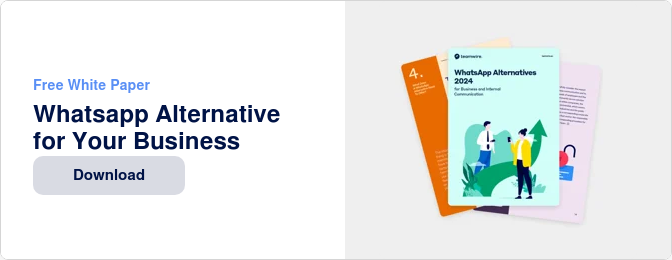The main advantage of these messaging apps is, that they are much faster and efficient than email and lead to improved team communication and higher productivity. On the other hand, when used in businesses these consumer messaging apps have significant weaknesses in use cases, data protection, security, administration, ecosystem integration, and support.
1. Whatsapp Does Not Provide Enterprise Data Protection
WhatsApp accesses and stores the address books of employees, which contain confidential corporate and customer data. While Whatsapp has announced improved encryption, it currently does not provide enterprise-grade encryption (e.g. metadata, storage on devices, storage on servers, etc). In addition, free services like WhatsApp require user data to make a living. WhatsApp has announced that generates revenues from businesses by allowing them to communicate to customers. Such a business model requires knowledge of your users and conflicts with minimal use of personal data, general data reduction, and strong data protection.
2. Whatsapp Is a Cloud Service Based in the USA
Due to the weak data protection laws and the broad surveillance in the USA, cloud services based or hosted in the USA cannot ensure the comprehensive data protection required by businesses and their employees and customers. This is especially relevant for European companies, who need to comply with European law and seek strong data protection for their enterprise and customers.
3. Whatsapp Mixes Private and Business Communication
For enterprises, it is important to separate business from private communication. First, a dedicated enterprise messaging app allows faster access and gives a better overview of everything relevant to internal communication, thus increasing productivity. Second, confidential business content is protected in enterprise messaging apps because it can only be shared with colleagues and the content distribution is under the control of the enterprise IT. Third, the motivation and satisfaction of employees are improved with a professional messaging tool, since people value a separation of private and business communication. (BTW for similar reasons there are personal and business email addresses. It is rather unprofessional to mix private and business communication in one account.
4. WhatsApp Lacks Enterprise Administration
Businesses need to be able to manage their users professionally. An administrator portal helps to ensure an easy roll-out, transparent monitoring, company-wide communication policies, simple user management, pre-configured devices, managed groups, quick support, comprehensive access control, compliant archiving, and much more. These things are not possible with WhatsApp and require a professional enterprise messaging app.
5. WhatsApp Does Not Protect Against Data Loss
To prevent loss of business data and content, for example, when a mobile device gets lost or stolen, enterprises require a mobile security layer. Leading business messaging apps support enterprise mobility management solutions (like MobileIron or Airwatch) and provide advanced mobile application management. These features allow to remotely delete content, block access, disable copying of messages and control the sharing of digital content.
6. WhatsApp is Missing a Professional Desktop and Tablet Client
In addition to mobile devices and tablets, many workers have laptops and desktop computers. Professional desktop versions for Windows and Mac and tablet versions for iOS, Android, and Windows Phone are a core component of a complete messaging solution for businesses. A desktop and tablet version of an enterprise messaging app enhances use cases, improves usability, reduces email overload, accelerates team communication, and increases desktop productivity. WhatsApp only offers a weak “companion” desktop client that a) permanently needs to be connected to your phone to work properly and b) introduces certain security risks.
7. WhatsApp Focuses on Consumer Use Cases
WhatsApp is a great tool for communicating with family and friends. That is how the app has become popular and where the future roadmap is focused on. However, with the professionalization of messaging, more and more business use cases are emerging that require a sophisticated feature set. Enterprise messaging apps provide e.g., calendar sharing, searching for content, corporate groups, team polls, directory access, and file sharing.
8. WhatsApp Does Not Support Enterprise File Sharing Solutions
Businesses often use enterprise-grade file-sharing solutions like Microsoft Sharepoint, Box, Novell Filr, Business Connector, Accellion, or Acronis, which are not supported by WhatsApp at all. Since file sharing with colleagues and teams is a regular use case, employees should be able to directly share documents from their file-sharing solution via the enterprise messaging app. This helps to simplify and accelerate workflows.
9. WhatsApp is Short of Ecosystem Integrations
While many people have understood the importance of a “WhatsApp for Enterprise” for internal business communication, fewer people yet see the importance of the integration of a messaging app into the IT ecosystem. This is an increasingly important component of an enterprise messaging app, though. Businesses can automate workflows, accelerate processes, improve operational execution, and increase productivity with the integration of e.g., ERP, CRM, accounting, HR, manufacturing, and logistics systems into enterprise messaging.
10. WhatsApp Lacks Enterprise Support and Audit-Proof
Needless to say businesses immediately require support if something is not working as it should. Only professional enterprise messaging services provide 24/7 monitoring and support with dedicated personnel. Besides, businesses often need audit-proof backup and archiving functionality for compliance reasons.
Overall, WhatsApp is a great consumer messaging app and there are many reasons why the service has been widely adopted by families and friends. However, when it comes to messaging with colleagues and teams, businesses should avoid the downsides of WhatsApp and choose a dedicated enterprise messaging app like Teamwire.

